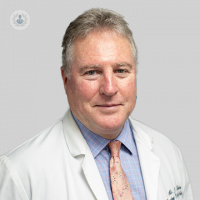Nasal deformity: when to see a doctor
Written in association with:Nasal deformities are caused by a number of things such as being congenital, where you inherit certain features from your parents. They can also be developmental in nature where one or another of the elements within the nose (the bone or the cartilage) can grow too much or can grow too little. As a result, they produce either an external or an internal abnormality, resulting in a cosmetic or even a functional problem.
Trauma, such as a significant injury to either a previously normal nose or a previously abnormal nose, can result in significant disruption and obviously external visible cosmetic deformity or perhaps even internal malfunction.

How do I know if I have a nasal deformity?
External nasal deformities are plainly visible and the individual themselves will be quite aware that there is an element of the nasal passage and the nasal dorsum that doesn't look good. Friends and relatives may have mentioned this to you and quite often people have developed a little bit of a complex about the way it looks anyway. So, the external appearance is obviously very important and that doesn't require any great expertise to understand.
Internally, a little bit different. For instance, there is a disruption of the internal structures, you could have a nasal obstruction which could be intermittent or indeed it could be one side or both sides or an alternating side problem. You can also have problems in terms of recurrent infections and problems like that. So, these are the sort of things that will alert one to having some sort of a nasal deformity.
When should I see a doctor?
It's worthwhile seeing a doctor when the problem with your nose impacts on your quality of life. If the external appearance of your nose is such a concern to the point where you don't want to have photographs taken, or in more extreme cases, maybe you don't want to go out because you're lacking in self-confidence, then perhaps it’s time to consult with your doctor. Initially, you would visit your GP and then probably a specialist after that.
The other things internally are more functional issues, when the nose is blocked and you can't breathe properly then obviously that's problematic in the daytime but at night these things present particular problems for people trying to sleep. This means that you have to breathe through your mouth as you can't breathe through your nose, your mouth gets dry, you wake up multiple times and you feel very tired. These are the sort of situations where you might want to discuss this with your GP and ask them for some treatment but obviously, if the treatment is not working, then you really need to see a specialist who can talk you through a tailored rhinoplasty procedure plan.


